Release
The title track was released as a single (with B-side "The Age of Desperation") but failed to chart. It was a more instrumented version than on the album, arranged by Richard Hewson. [3] Its melody was borrowed by Oasis for their single "Whatever", released in 1994; Innes claimed plagiarism and as a result received royalties and a co-writing credit. [4] [5]
The album was re-released by United Artists in 1980 under the title Neil Innes A-Go-Go [6] and by EMI in 1994 with additional tracks – most of which had been released on singles – under the title Re-Cycled Vinyl Blues. [2] This edition of the album was dedicated to Ollie Halsall, who had died in 1992, and former Bonzo Dog bassist Dennis Cowan, who had died in 1972; [7] it featured a guest appearance by Michael Palin on the title track. [2]
Innes later said of this time the album was recorded,
United Artists had been very kind to me ... In my own way, I wanted to repay them – by making a bunch of silly singles at a time when the music industry still seemed to have a sense of humour. Wrong again. [6]
Innes performed the title song on Monty Python Live at the Hollywood Bowl and on Monty Python Live at Drury Lane . [1] Surviving members of Monty Python performed the song for Terry Jones's funeral at Golders Green Cemetery.

The Rutles were a rock band that performed visual and aural pastiches and parodies of the Beatles. This originally fictional band, created by Eric Idle and Neil Innes for a sketch in Idle's mid-1970s BBC television comedy series Rutland Weekend Television, later toured and recorded, releasing two studio albums and garnering two UK chart hits. The band toured again from 2002 until Innes' death in 2019.

Neil James Innes was an English writer, comedian and musician. He first came to prominence in the pioneering comedy rock group Bonzo Dog Doo-Dah Band and later became a frequent collaborator with the Monty Python troupe on their BBC television series and films, and is often called the "seventh Python" along with performer Carol Cleveland. He co-created the Rutles, a Beatles parody/pastiche project, with Python Eric Idle, and wrote the band's songs. He also wrote and voiced the 1980s ITV children's cartoon adventures of The Raggy Dolls.
The Concert for George was held at the Royal Albert Hall in London on 29 November 2002 as a memorial to George Harrison on the first anniversary of his death. The event was organised by Harrison's widow, Olivia, and his son, Dhani, and arranged under the musical direction of Eric Clapton. The profits from the event went to the Material World Charitable Foundation, an organisation founded by Harrison.
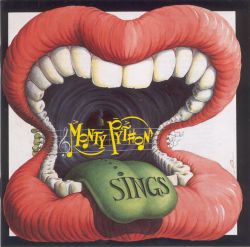
Monty Python Sings is a compilation album of songs by English comedy troupe Monty Python. Released in 1989 to celebrate their 20th anniversary, it contains popular songs from their previous albums and films. The album was dedicated to the memory of founding member Graham Chapman, who died two months before its release.
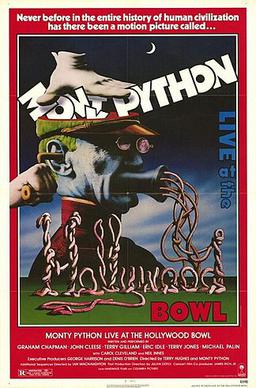
Monty Python Live at the Hollywood Bowl is a 1982 concert comedy film directed by Terry Hughes and starring the Monty Python comedy troupe as they perform many of their sketches at the Hollywood Bowl. The film also features Carol Cleveland in numerous supporting roles and Neil Innes performing songs. Also present for the shows and participating as an 'extra' was Python superfan Kim "Howard" Johnson.
GRIMMS was an English pop rock, comedy, and poetry group, originally formed as a merger of The Scaffold with two members of the Bonzo Dog Doo-Dah Band and the Liverpool Scene for two concerts in 1971 at the suggestion of John Gorman.
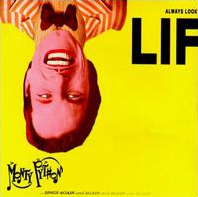
"Always Look on the Bright Side of Life" is a comedy song written by Monty Python member Eric Idle that was first featured in the Python film Life of Brian and has gone on to become a common singalong at public events such as football matches as well as funerals.

All You Need Is Cash is a 1978 television film that traces the career of a fictitious English rock group called the Rutles. As TV Guide described it, the group's resemblance to the Beatles is "purely – and satirically – intentional".
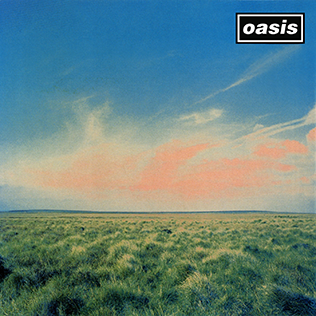
"Whatever" is a song by English rock band Oasis. Written by the band's lead guitarist, Noel Gallagher, it was released on 18 December 1994 by Creation as the band's first non-album single. A subsequent lawsuit awarded a co-writing credit to Neil Innes.

Monty Python's Previous Record is the third album by Monty Python. Released in 1972, it marked the group's first collaborations with regular sound engineer Andre Jacquemin as well as musician Neil Innes, who had previously appeared with future members of the Python team on Do Not Adjust Your Set. The album contains many sketches from the third series of Flying Circus, one from the second as well as an abridged version of "The Tale of Happy Valley" from the second German show. The album was released midway through the broadcast of Series 3, whose sketches featured on the album were all from its first half, with the exception of "Dennis Moore" which aired a month later and therefore made its debut here. The oldest sketch on the album, Eric Idle's "Radio Quiz Game", dates back to I'm Sorry, I'll Read That Again where it was performed by Graeme Garden - Idle having subsequently performed the sketch himself on two editions of Do Not Adjust Your Set. The rest of the material was specially written for the album.
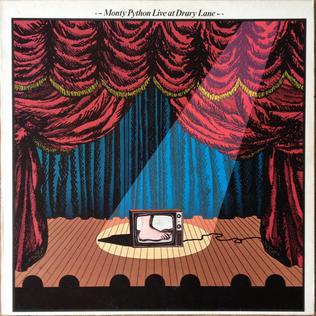
Monty Python Live at Drury Lane is a live album released by Monty Python in 1974. It was recorded on the final night of their four-week run at the Drury Lane Theatre in London earlier that year and edited onto disc with new studio linking material by Eric Idle and Michael Palin. The majority of the sketches are from Flying Circus and vary slightly from their television counterparts, although "Cocktail Bar" was written for the third series but not used. The team also revived sketches from At Last The 1948 Show, including "Secret Service", "Wrestling" and "Four Yorkshiremen" - the latter on its way to being adopted as a Python standard. Neil Innes provided the musical interludes, while Eric Idle's then wife Lyn Ashley replaced regular Python actress Carol Cleveland in supporting roles.

The Album of the Soundtrack of the Trailer of the Film of Monty Python and the Holy Grail is the first film soundtrack album by Monty Python, released in 1975. It features selected scenes from Monty Python and the Holy Grail interspersed with a large volume of new studio material, much of which centers on a spoof screening of the film at the Classic Silbury Hill Theatre. Also among the new items is the "Marilyn Monroe" sketch, which Graham Chapman co-wrote with Douglas Adams - the pair having recently collaborated on the fourth series of Monty Python.
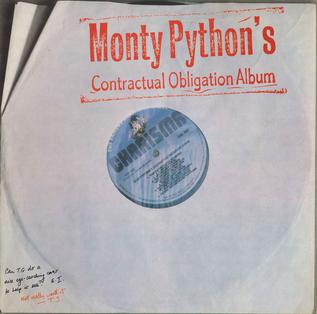
Monty Python's Contractual Obligation Album is the final studio album by Monty Python, released in 1980. As the title suggests, the album was put together to complete a contract with Charisma Records. Besides newly written songs and sketches, the sessions saw re-recordings of material that dated back to the 1960s pre-Python shows I'm Sorry, I'll Read That Again, The Frost Report, At Last The 1948 Show and How To Irritate People. One track, "Bells", dates from the sessions for Monty Python's Previous Record, while further material was adapted from Eric Idle's post-Python series Rutland Weekend Television. The group also reworked material written but discarded from early drafts of Life Of Brian, as well as the initial scripts for what would eventually become The Meaning Of Life.

Peter John "Ollie" Halsall was an English guitarist best known for his role in the Rutles, the bands Timebox, Patto and Boxer, and for his contribution to the music of Kevin Ayers. He is also notable as one of the few players of the vibraphone in rock music. He was known by his childhood nickname 'Olly' or 'Ollie' which was simply a corruption of his surname. The Ollie Halsall Archive was established in 1998, with the aim of documenting and promoting his work.

Hastily Cobbled Together for a Fast Buck is the name of a bootleg of an unreleased album by Monty Python, mostly made up of outtakes from the 1980 sessions for their Contractual Obligation Album. The album was compiled by producer Andre Jacquemin in 1987 but pulled from release in favour of a compilation of previously released material, The Final Rip Off.
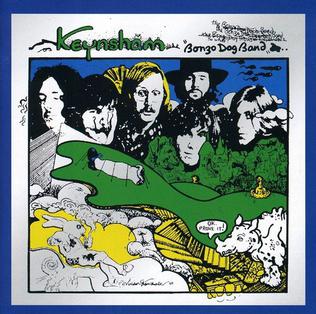
Keynsham is the fourth album by the Bonzo Dog Band. It was released in 1969 on Liberty Records.

The Rutles is a soundtrack album to the 1978 telemovie All You Need Is Cash. The album contains 14 of the tongue-in-cheek pastiches of Beatles songs that were featured in the film.

Archaeology is the second album by parody band The Rutles. Like their previous release, the album contains pastiches of Beatles songs.

The Bonzo Dog Doo-Dah Band was created by a group of British art-school students in the 1960s. Combining elements of music hall, trad jazz and psychedelia with surreal humour and avant-garde art, the Bonzos came to public attention through appearances in the Beatles' 1967 film Magical Mystery Tour and the 1968 ITV comedy show Do Not Adjust Your Set.
The Seventh Python is a 2008 musical documentary film about the career, music and philosophy of pop satirist and songwriter Neil Innes, who has been known as the "seventh" member of the six-man Monty Python comedy troupe. The film, however, shows how Innes' influence and experience goes far beyond that chapter, to include his work with the Bonzo Dog Doo Dah Band, The Rutles and other work. The Frozen Pictures film had its premiere at the American Cinematheque's Mods & Rockers Film Festival at the Egyptian Theatre in Hollywood in June 2008. The film was directed by Burt Kearns, and written and produced by Kearns and Brett Hudson.


















